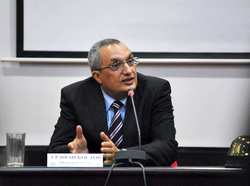Ivan Kostov
| Ivan Yordanov Kostov (Иван Йорданов Костов) |
|
|---|---|
 |
|
| 47th Prime Minister of Bulgaria | |
|
In office 21 May 1997 – 24 July 2001 |
|
| President | Petur Stoyanov |
| Preceded by | Stefan Sofiyanski (Acting) |
| Succeeded by | Simeon Sakskoburggotski |
| Personal details | |
| Born |
23 December 1949 Sofia, Bulgaria |
| Political party |
Union of Democratic Forces, Democrats for a Strong Bulgaria |
| Spouse(s) | Elena Kostova |
| Alma mater | University of National and World Economy, Sofia University |
| Profession | Economist |
Ivan Yordanov Kostov (Bulgarian: Иван Йорданов Костов) (born 23 December 1949, in Sofia) was the 47th Prime Minister of Bulgaria in office from May 1997 to July 2001 and leader of the Union of Democratic Forces (UDF) between December 1994 and July 2001.
Ivan Kostov graduated in Economics from the Karl Marx Higher Institute of Economics (today's University of National and World Economy) in Sofia in 1974, and later earned a Ph.D. in Mathematical Modeling of Economic Processes from Sofia University. He then worked as an associate professor at Sofia Technical University and entered politics after the collapse of the Berlin Wall and the fall of the Bulgarian communist leader, Todor Zhivkov. Kostov became an economic expert for the Union of Democratic Forces (UDF). His political career began as Member of Parliament in the 7th Grand National Assembly in 1990 (he was an MP from 1990 to 2013) and he went on to become Bulgaria's Finance Minister in the two consecutive governments of Dimitar Popov (December 1990 – October 1991) and Filip Dimitrov (November 1991 – December 1992).
Kostov was elected chairman of the UDF in 1994. During the winter of 1996 - 1997, mass protests took place against Bulgarian Socialist Party's government. The causes for the complete crisis were hyperinflation, unemployment and food shortages. The protests ultimately led to the fall of the socialist government. The UDF won the May 1997 elections, and Kostov became Bulgaria's Prime Minister, his cabinet eventually became the country's first post-communist government to serve its full 4-year term. He is credited with turning around his country's fortunes, implementing the currency board in Bulgaria, starting sustainable economic growth, and establishing a path towards Bulgaria's complete integration with the West. Under his government, long-delayed economic reforms were carried out, including privatization of state-owned enterprises was carried on a large scale and the country started long-sought accession talks with the European Union (which Bulgaria joined on January 1, 2007). In foreign affairs, Ivan Kostov followed a strongly pro-EU and pro-NATO course. Controversially during the war in Kosovo he allowed NATO but not Russia to use Bulgaria's airspace (despite overwhelming opposition in Bulgaria to the NATO air campaign against Yugoslavia). On the other hand, Kostov didn't allow refugees from Kosovo to enter Bulgaria.
...
Wikipedia
